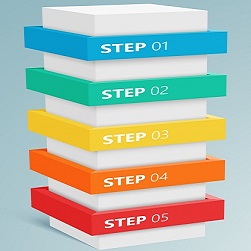What can you expect to be able to say in your language classes? How much should you be able to understand and communicate? What do you need to do in order to reach the next fluency step?
Remember: You will always be able to understand the language BEFORE you can fluently speak.
Step 1: Beginning Level Students
Students at this level are slow at understanding spoken language, need phrases repeated, and respond in 1 word or short answers.
• To move to next level: Listen! Listen! Listen! Listen to the same songs, stories, poems, etc. over and over in the target language in order to become faster at understanding the language. Listen every chance you get!
Step 2: Intermediate Level Students
Students at this level are faster to understand the spoken language, don’t require a lot of repetition, and can respond slowly in complete sentences. Open ended questions such as “Why?” or “What happened?” will still be very difficult.
• To move to the next level: Force yourself to use complete sentences when possible. Keep listening, and work at responding quicker to questions
Step 3: Advanced Low Level Students
Students can understand the spoken language, can respond fairly quickly to simple questions, and should be able to start putting sentences together to form paragraphs while conversing.
• To move to the next level: Begin to put simple sentences together to form larger ideas. Describe everything around you. Invent very simple stories using short sentences.
Step 4: Advanced High Level Students
Students can understand and respond quickly. Students should be able to speak in paragraphs and begin to describe simple stories.
• To move to the next level: Practice telling stories. Tell about what you did yesterday, a funny thing that happened in the past, or an embarrassing story. Try to make the stories more complex each time you tell them.
Step 5: Superior Level Students
Students can understand and respond with details quickly. Students should be able to tell stories and begin to build more complex stories with details.
• To move to the next level: Learn more technical vocabulary or vocabulary of something different than you are used to talking about. Learn to talk around the words that you don’t know. Read stories, poems, novels, and talk about them!
You can’t skip any of the steps in order to reach fluency, but you can make the steps shorter by practicing the skills needed at the next levels.

